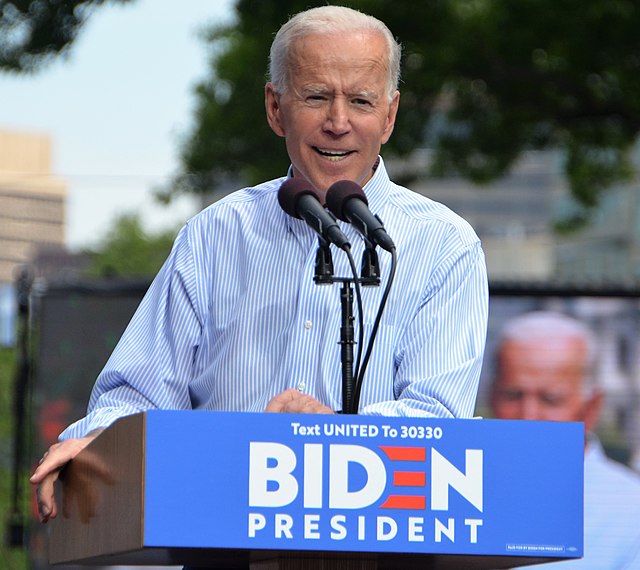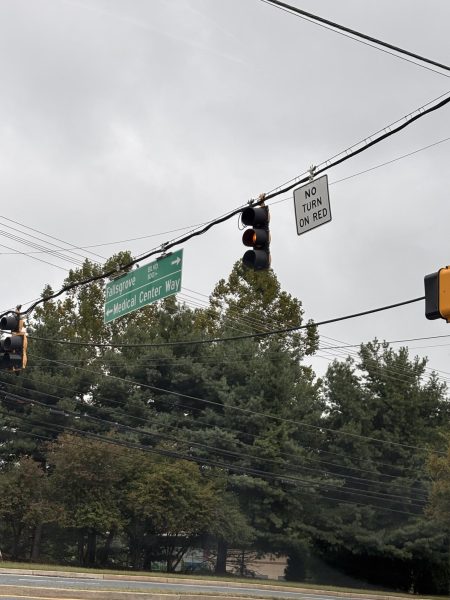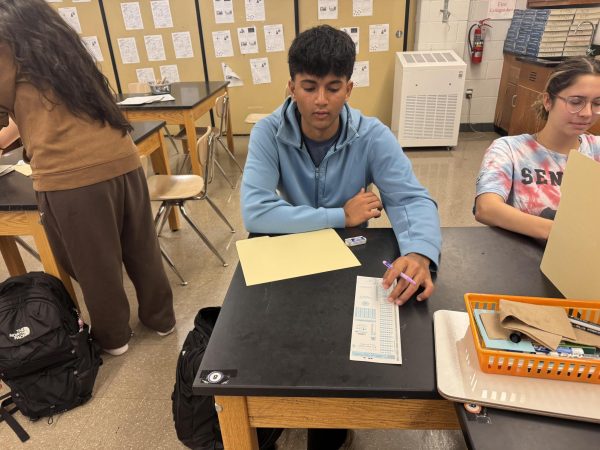Why your vote matters
Photo used with permission from Wiki Commons
President Joe Biden campaigned on a transformative policy agenda. He has turned proposals into law despite a historically narrow Congressional majority.
The midterm elections are quickly approaching. Initially, Republicans were massive favorites to retake both the Senate and the House of Representatives, but inexperienced and extreme candidates in Senate races, combined with a national shift toward Democrats after Roe. V Wade’s reversal, have left Democrats as slight favorites to hold the Senate, and slightly underdogs to hold the House, according to FiveThirtyEight. Media coverage continues to focus on horse-race jockeying between the two parties. However, it is vital to look back on the previous two years and evaluate President Joe Biden’s legislative achievements.
The American Rescue Plan
Wasting little time after his inauguration, Biden secured the passage of a $1.9 trillion package that heavily assisted in the economic recovery from Covid-19. One of its most well known aspects were the $1,400 stimulus checks, but increased funding toward schools was also a significant part of this law. According to the White House, “Independent experts estimate based on school district plans that 59% of school districts are using ARP funds to hire/retain teachers and counselors, 35% are using ARP funds to hire/retain psychologists and mental health staff, and 52% are using ARP funds for HVAC and ventilation.”
Perhaps the most impactful provision of this law was the expanded child tax credit.
It provided up to $3,600 for children under age six and $3,000 for children under 18. Half of those sums were delivered through monthly payments, while the remaining balance was available to families through their 2021 tax returns, according to CNBC.
The impact of this policy was substantial, as it cut child poverty in half. In order to secure its passage, the expanded child tax credit required renewal one year after its passage, a vote that was sunk by all 50 Senate Republicans, and West Virginia Senator Joe Manchin (D), who refused to support the reauthorization of the policy. With a larger Senate majority, it is very likely Democrats would reinstate the expanded child tax credit.
Infrastructure Investment and Jobs Act
America has a crumbling infrastructure. The American Society of Civil Engineers (ASCE) gives the nation’s infrastructure a D+ grade. Doing what generations of presidents could not, Biden secured the passage of a $1.2 trillion bipartisan public works law that invests in both traditional infrastructure repairs and replacement, along with more modern technologies.
$110 billion will be used to repair the nation’s highways, bridges and roads. According to the White House, 173,000 total miles of America’s highways and major roads and 45,000 bridges are in poor condition. There is also a $40 billion investment in bridges, the largest since the creation of the national highway system. Another $25 billion would be used to improve airports, ranging from runways and gates to repairing the air traffic control tower infrastructure.
According to VOA, the $39 billion for public transit in the legislation would expand transportation systems, improve accessibility for people with disabilities and provide dollars to state and local governments to buy zero-emission and low-emission buses.
The Department of Transportation estimates that the current repair backlog is more than 24,000 buses, 5,000 rail cars, 200 stations and thousands of miles of track and power systems.
The Infrastructure Investment and Jobs Act also allocated $65 billion in broadband access for rural, lower income and tribal populations. The $15 billion allocated for removing and replacing lead pipes across the country is much needed, and represents a historic investment in communities that have long been neglected.
By 2026, auto manufacturers will be required to place sensors in their cars that prevent the car from starting when the driver is impaired. This includes analyzing the blood alcohol content in the driver’s breath and skin. Additionally, sensors scan the driver’s eyes. According to the CDC, 30 people die in drunk driving related accidents every day.
As a former President Trump 2024 campaign looms, it is worth noting that for the first two years of his presidency, he had wider majorities in both the House and Senate than Biden and Democrats currently enjoy. He failed to enact any significant infrastructure law, let alone a bipartisan one supported by 62% of Americans, and 71% of likely voters. Biden’s accomplishment is difficult to overstate.
The Russian invasion of Ukraine
Conventional wisdom as the Russian invasion of Ukraine began was that Russia would quickly overrun Ukraines defenses and seize their capital city of Kyiv within days. Despite the sense of foreboding, while ceding some Western territory, Ukrainian defense held strong in Kyiv, forcing Russian troops back. In the last few weeks, Ukraine has even operated a successful counterattack that liberated land Russia had taken under control six months ago.
The world was initially shocked, and has been inspired by the bravery and military effectiveness of the Ukrainians defending their country. According to Politico, to date, the U.S. has provided about $10.6 billion in military aid to Ukraine since the beginning of the Biden administration, including 19 packages of weapons taken directly from Defense Department stocks since August 2021.
In response to this conflict, Sweden and Finland joined N.A.T.O, strengthening the trade and military alliance against any future authoritarian aggression. This required a Senate vote, which passed nearly unanimously.
Much was made of Trump’s connections to Russia and Putin, with Trump often praising Putin and putting his word above the FBI’s intelligence. This funding has helped the Ukrainian people continue to fight, and it’s hard to imagine the same level of support if Trump had been directing the response.
Safer Communities Act
2021 and 2022 have seen the return of a horrific tragedy that briefly abated during quarantine: mass shootings. There have been 508 mass shootings in the first eight months of the year, averaging well over one per day. The unconscionable loss of 19 students and two teachers finally spurred the passage of the Safer Communities Act, the first bipartisan gun control legislation in decades.
According to the Senate, the Safer Communities Act provides increased funding for states to implement “red flag laws”, which is when a court orders temporary rectrions on personal gun ownership if someone is deemed to be a threat to themselves or others. This law also closes what was referred to as the Boyfriend Loophole, in which domestic abusers that were not married to the person they abused would not have that abuse show up in a background check.
There are also significant mental health provisions, which address the root of so many of these atrocities. There is increased funding for schools to sue for student mental health and school security. This law recognizes that stopping mass shootings cannot only be about restricting gun rights; a broader approach is needed. You can read every provision in the law here.
Considering the decades-long drought of any federal action in part due the power of the NRA, this law is incredibly significant. Still, it does not go as far as Biden has pushed for. In a rally in Rockville, Biden referenced his important role in the 1994 ban of assault rifles, saying “I did it once and I can do it again.”
CHIPS and Science Act
Research and development spending was at its greatest as a percentage of the federal budget in the 1950s and ‘60s, coinciding with remarkable technological and engineering achievements. In recent decades, this spending has fallen. One area in which America has fallen behind is the production of semiconductor, essential for both consumer products and national security technologies.
Despite inventing semiconductors, America currently produces just 10% of the world’s chips, relying on East Asia, specifically China for production of 75% of the world’s chips. As the American-Chinese relationships grow more confrontational, this imbalance could lead to a national security issue, as America may not have access to the most advanced technologies. In the first week after the passage of the CHIPS and Science Act, companies have announced nearly $50 billion in additional investments in American semiconductor manufacturing.
Inflation Reduction Act
In late December 2021, after months of prolonged negotiation, Manchin retreated and declared he could not support the Build Back Better Act, which held much of Biden’s economic agenda. In turn, nearly all declared his agenda dead, and his time with a slim Democratic majority in both houses of Congress as a failure.
Perhaps a less experienced leader would have aquised, and focused on other aspects of their presidency and agenda. However, Biden, as a former Senator, knew that pressure over time could yield results, and that he shouldn’t give up on his agenda just yet. This yielded the passage of a roughly $750 billion Inflation REduction Act, which preserved nearly all investments in fighting against climate change, and healthcare and prescription drug reforms, while keeping Biden’s promise not to raise taxes on any Americans making under $400,000.
This law was the largest investment ever in fighting climate change. The much smaller funding and credits available in 2009’s Recovery Act helped spur an explosion of renewable power, and thus larger investment should further that goal, while providing incentives to reduce emissions for large corporations. This law also empowers medicare to negotiate the price of presentation drugs with pharmaceutical companies, saving hundreds of billions in tax dollars. Furthermore, there is a cap of annual out-of-pocket healthcare expenses for seniors of $2,000.
Student Loan Forgiveness
Fulfilling a campaign promise, Biden used executive action to cancel $10,000 of student loan debt per borrower who makes less than $125,000 annually, and up to $20,000 for those with Pell Grants, a program for lower-income borrowers.
Appointment of Judges
Through this point in his presidency, Biden has appointed more judges to federal courts than any president since John F. Kennedy. His slate of judges has also been more diverse than any other previous president. His most significant appointment thus far was Supreme Court Associate Justice Ketanji Brown Jackson, arguably the most qualified nominee the court had seen.
Job recovery
Biden has had an unmatched record of job recovery and creation during the first two years of his presidency. The unemployment rate reached 3.5% in July 2022, years before it was projected as Biden entered office. Before the passage of the American Rescue Plan, the Congressional Budget Office projected an unemployment rate of 5.1% in 2022.
One year later, after the passage of the American Rescue Plan, this projection dropped to 3.8%, and then 3.6%. There have been nine million jobs added in the first 17 months of Biden’s presidency, more than any other presidency.
This economic recovery was not guaranteed to transpire. A Moody’s Analytics report found that without ARPA, “Because of the weakened economy, unemployment rises back over 7% in summer 2021 and remains materially higher after that.”
Unions
Biden has also been pro-union, supporting high-profile unionization efforts in Amazon, Starbucks, and other large corporations over the past year. The PRO Act would increase the power of unions. One of its most significant aspects is requiring employers to allow employees to use work communication devices and systems to communicate about and conduct organizing efforts. This bill, like many other more progessive issues like immigrration reform, and any type of healthcare public option, remains impossible to pass given the 50-50 Senate, underscoring the stakes of this election.
Looking Ahead
In the coming weeks, the Senate is expected to hold a vote on the Respect for Marriage Act. This bill pirmarliy cements the legal protection issued by the Supreme Court in given to same-sex marriage. It passed the House this past summer, with every House Democrat voting for it, and 47 House Republicans, roughly 22% of their caucus.
Although there certainly has been no shortage of sweeping action thus far, Democrats have the ability to tell voters that they have delivered on many promises, but your vote could ensure further progress in every area of public policy. In the words of John Lewis, “Your right to vote is precious, almost sacred. It is the most powerful nonviolent tool we have to create a more perfect union.”
Your donation will support the student journalists of Thomas S. Wootton High School. Your contribution will allow us to purchase equipment and cover our annual website hosting costs.
Ethan is a 2023 graduate.







